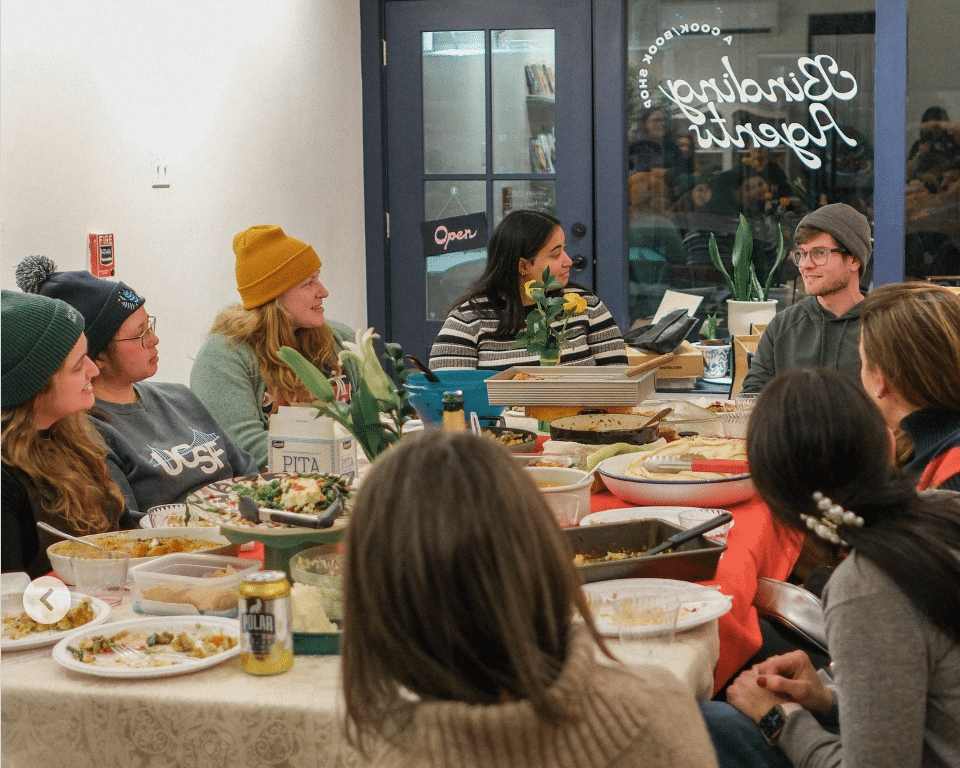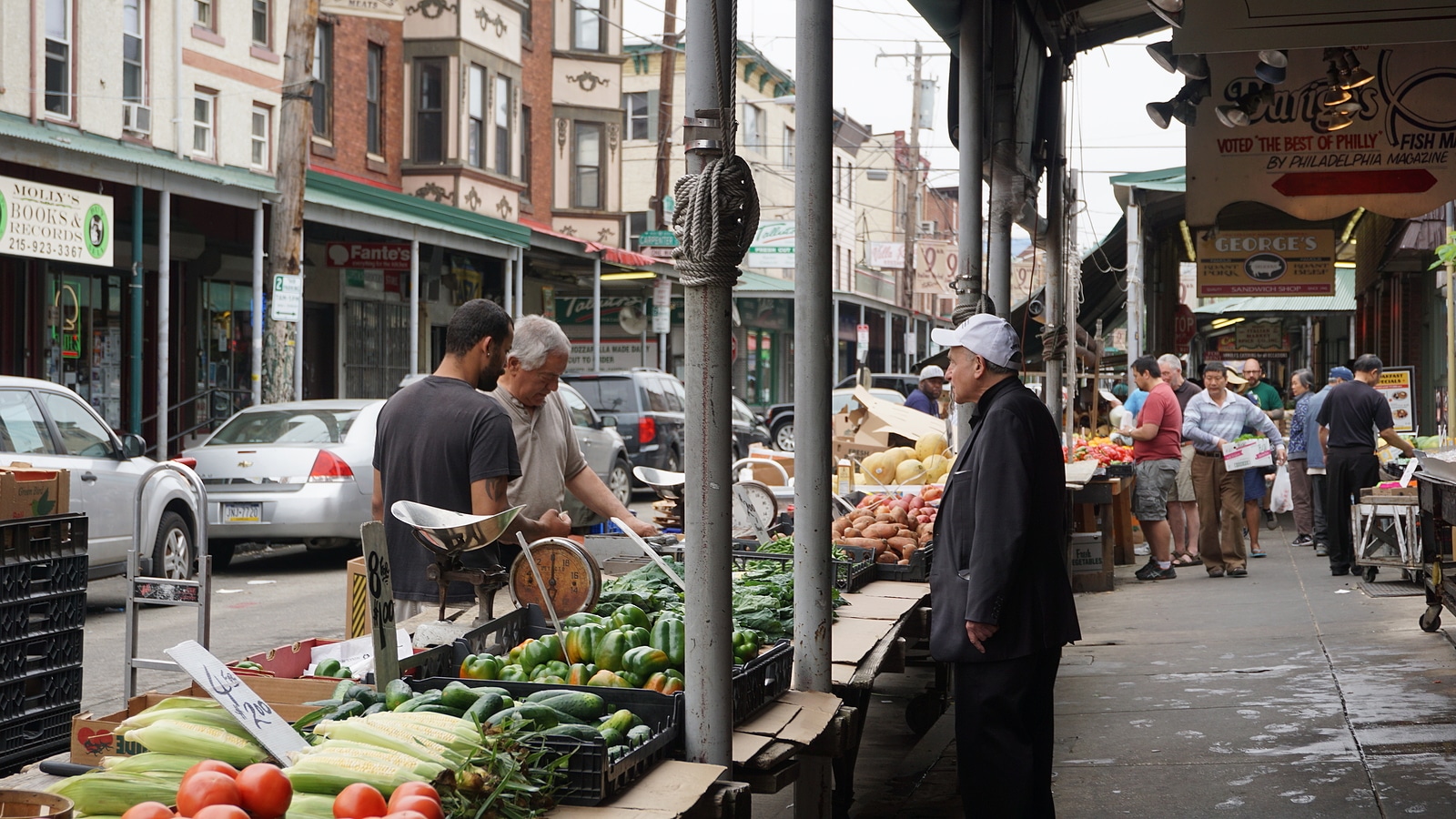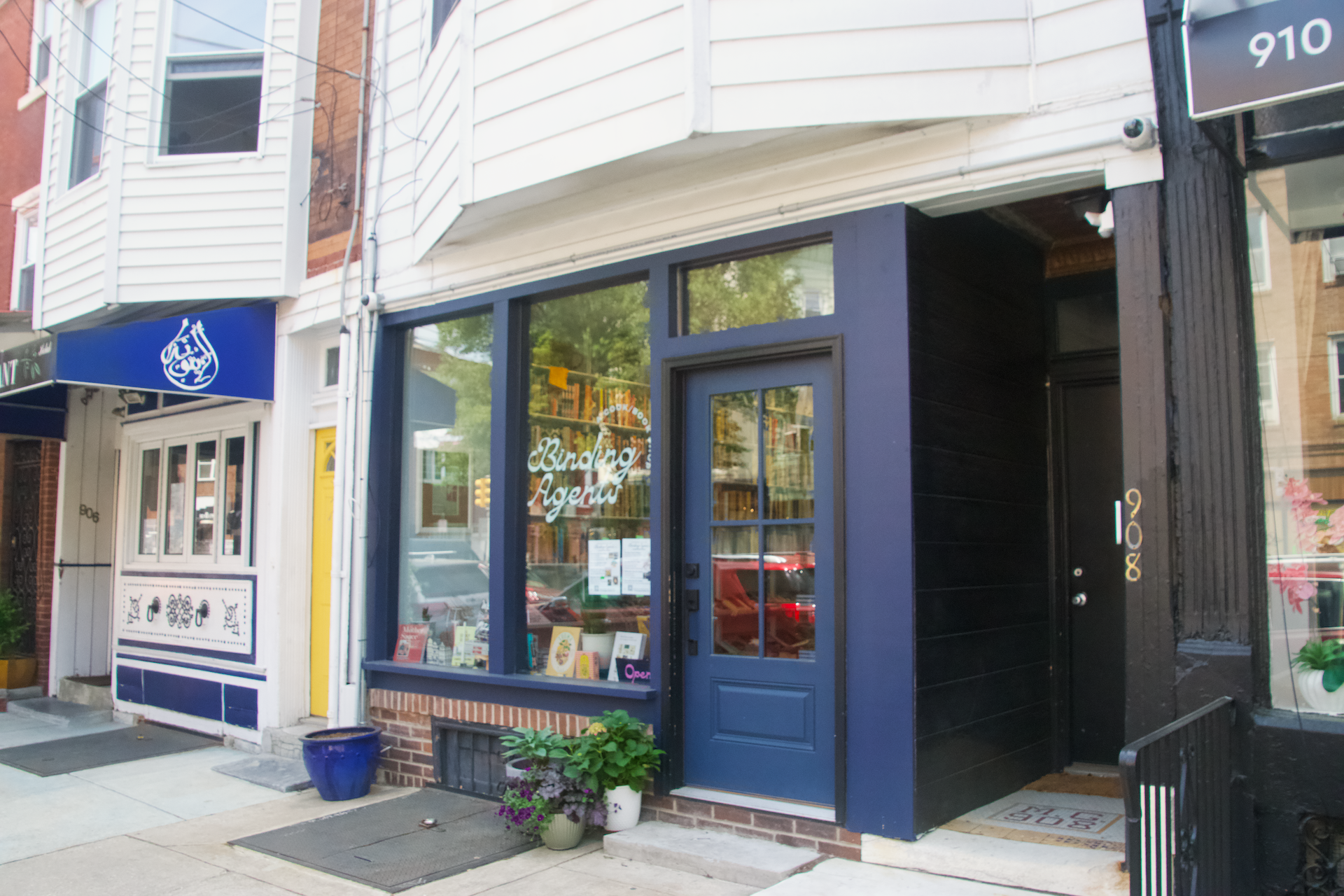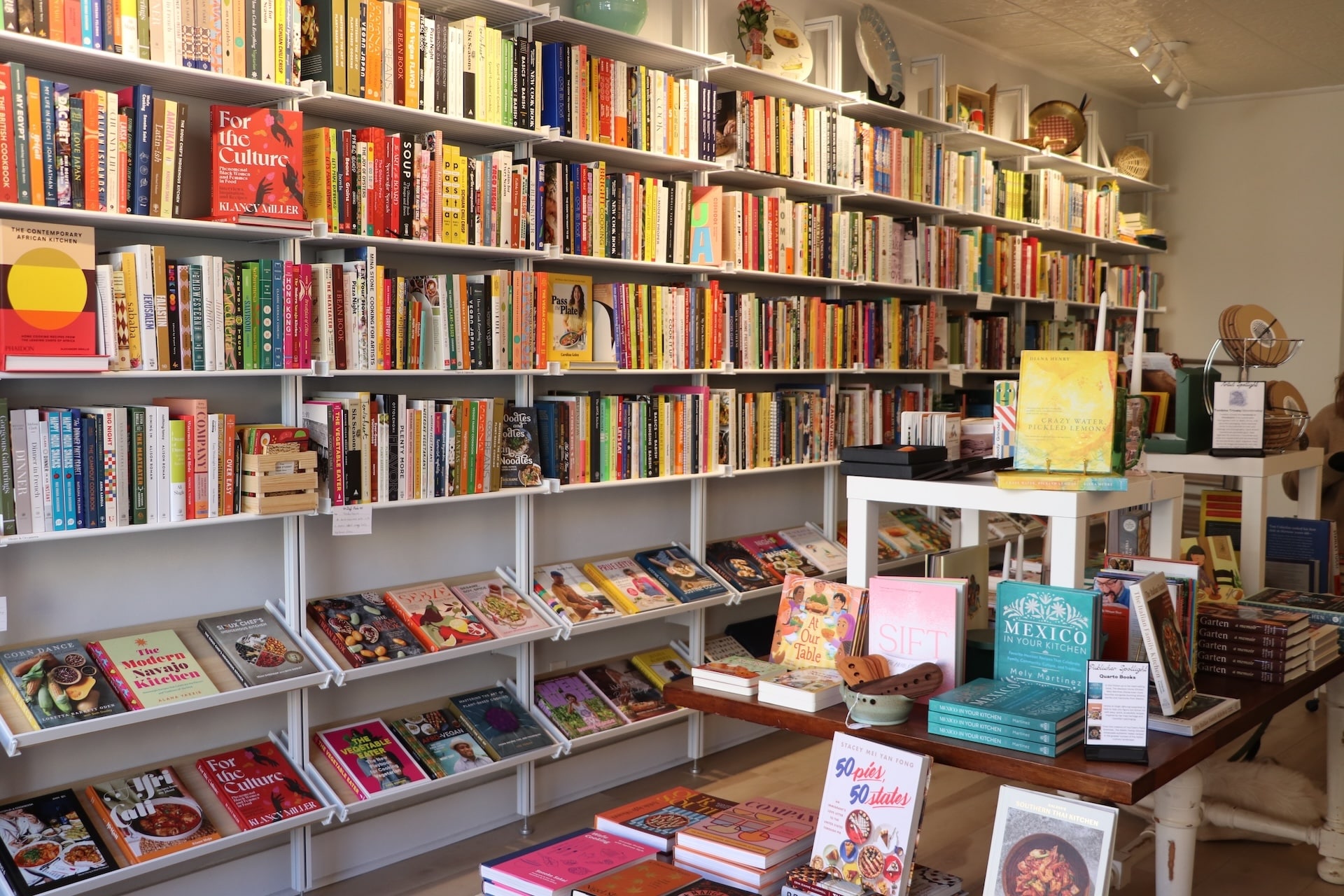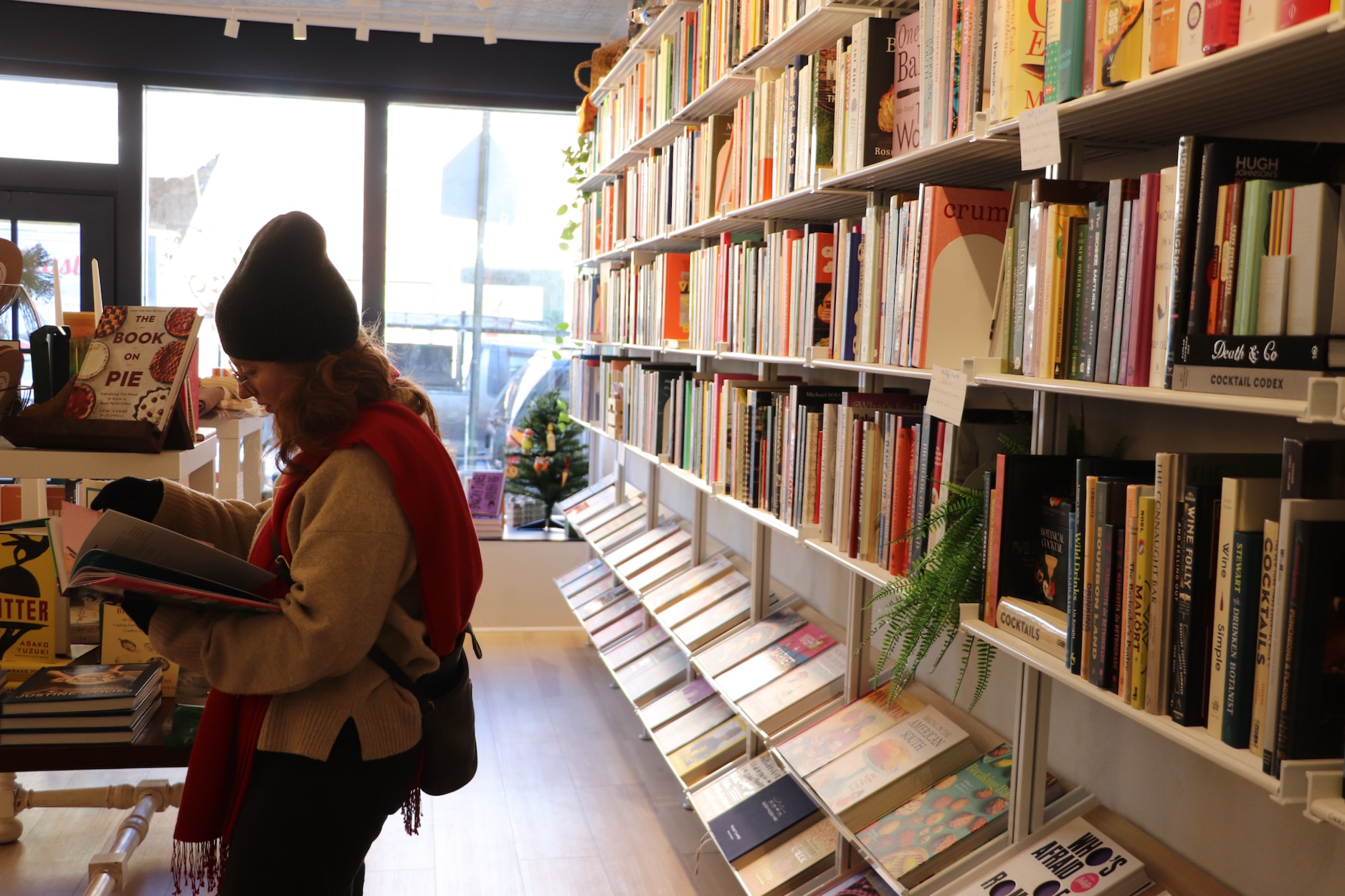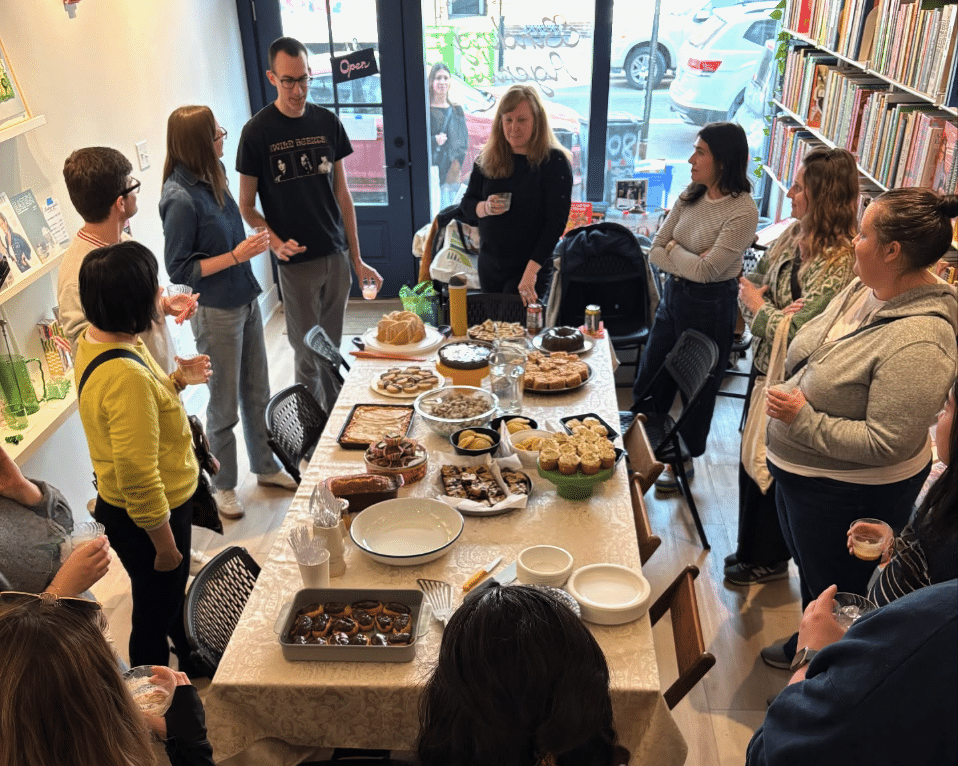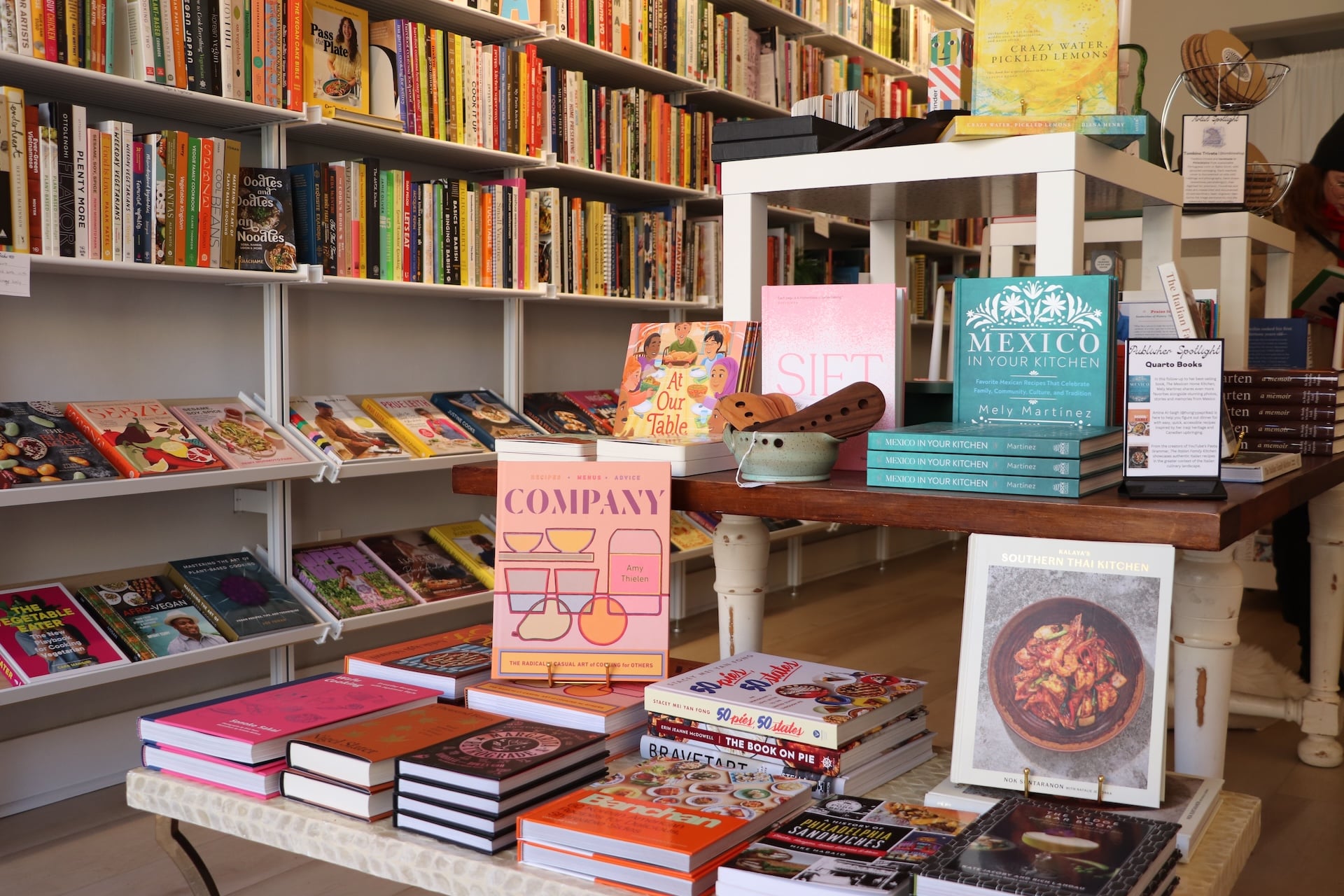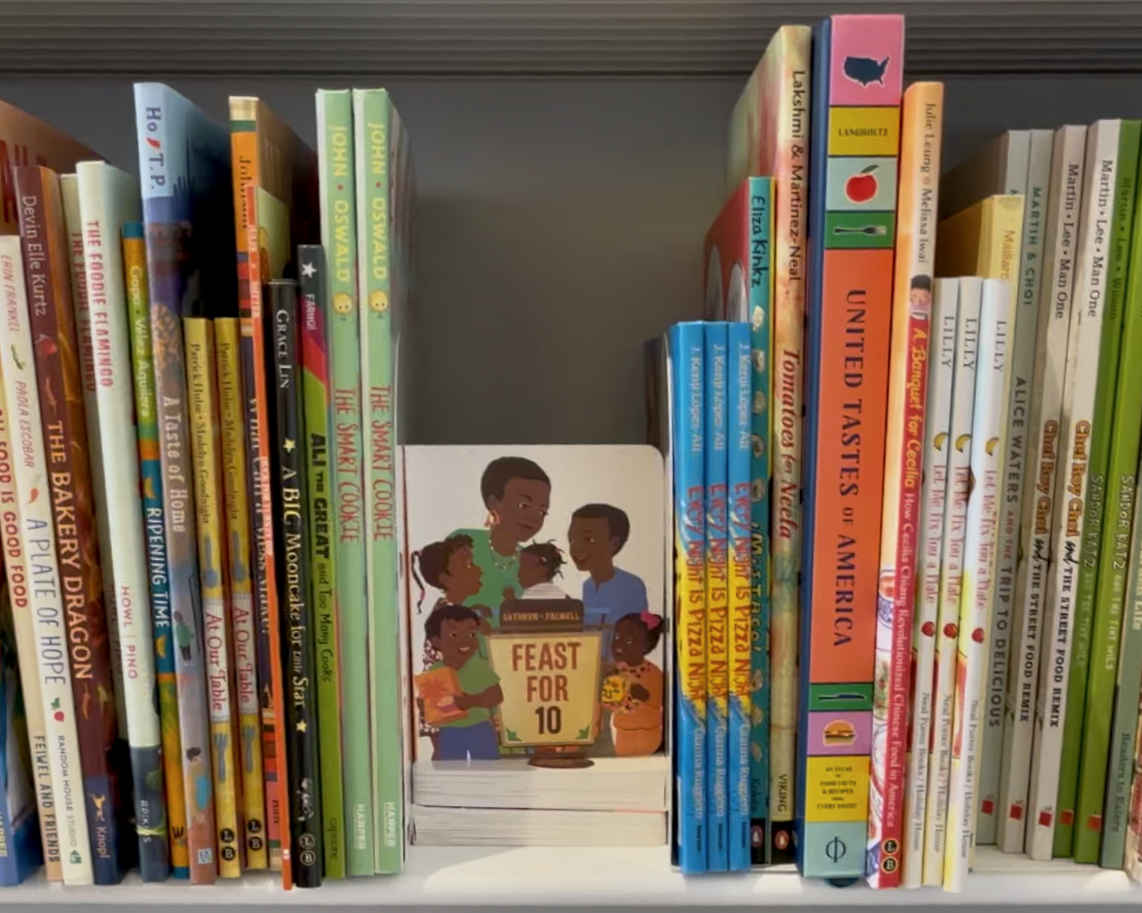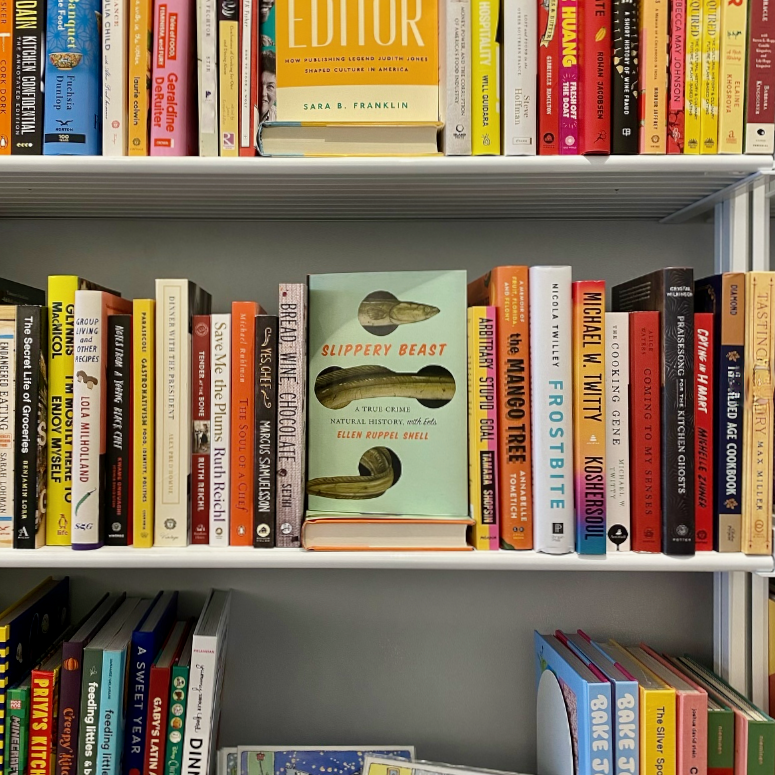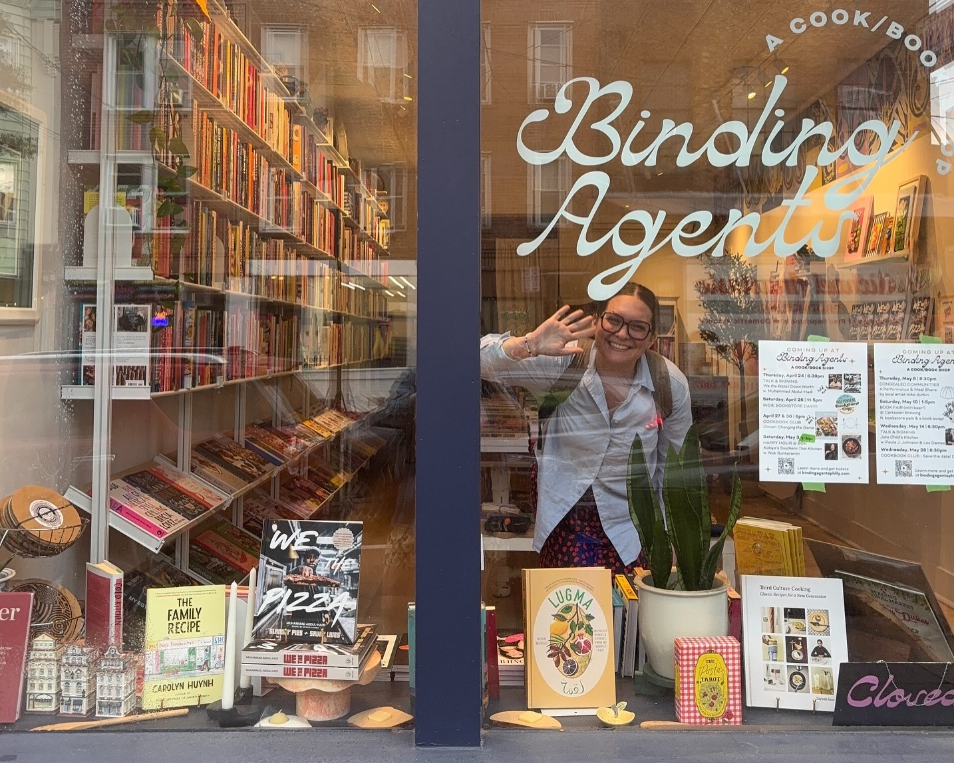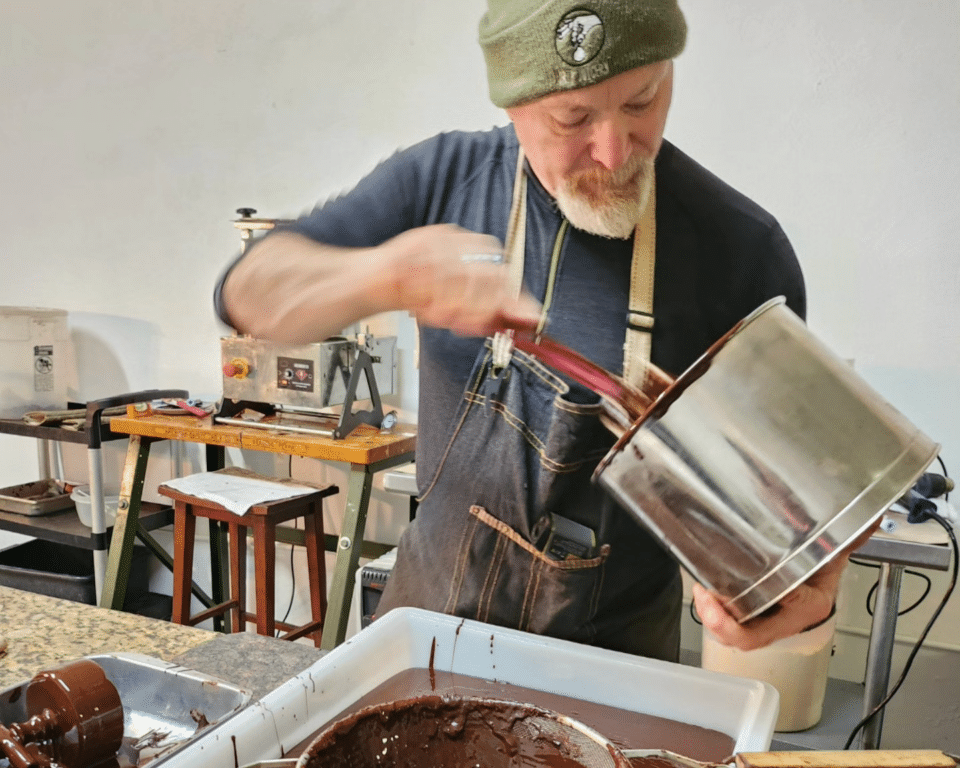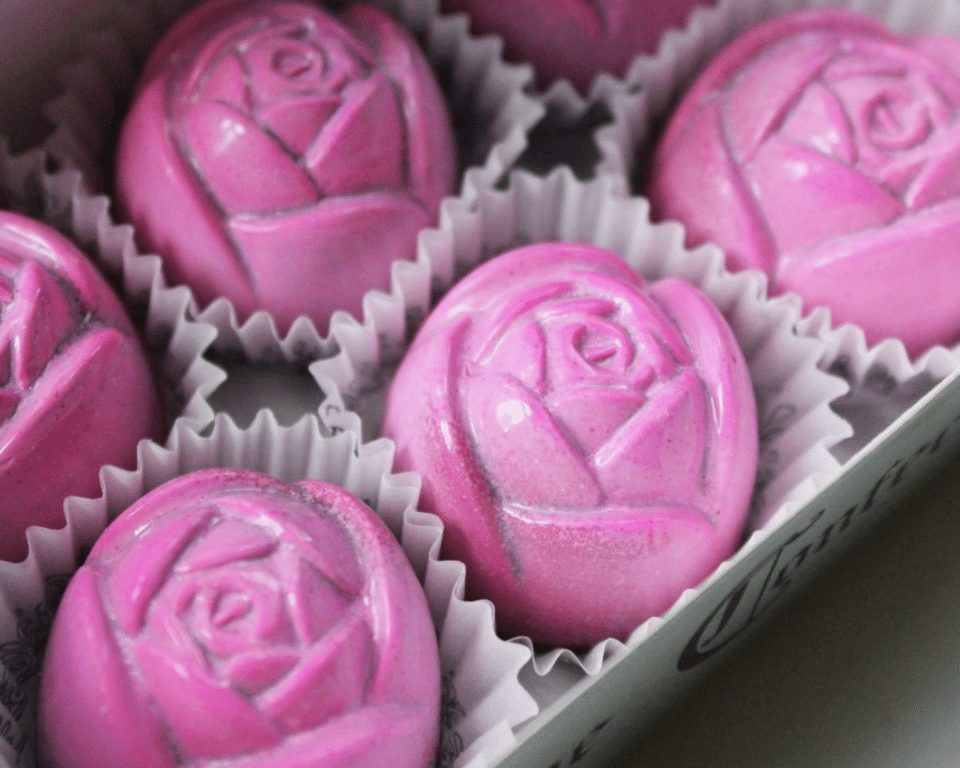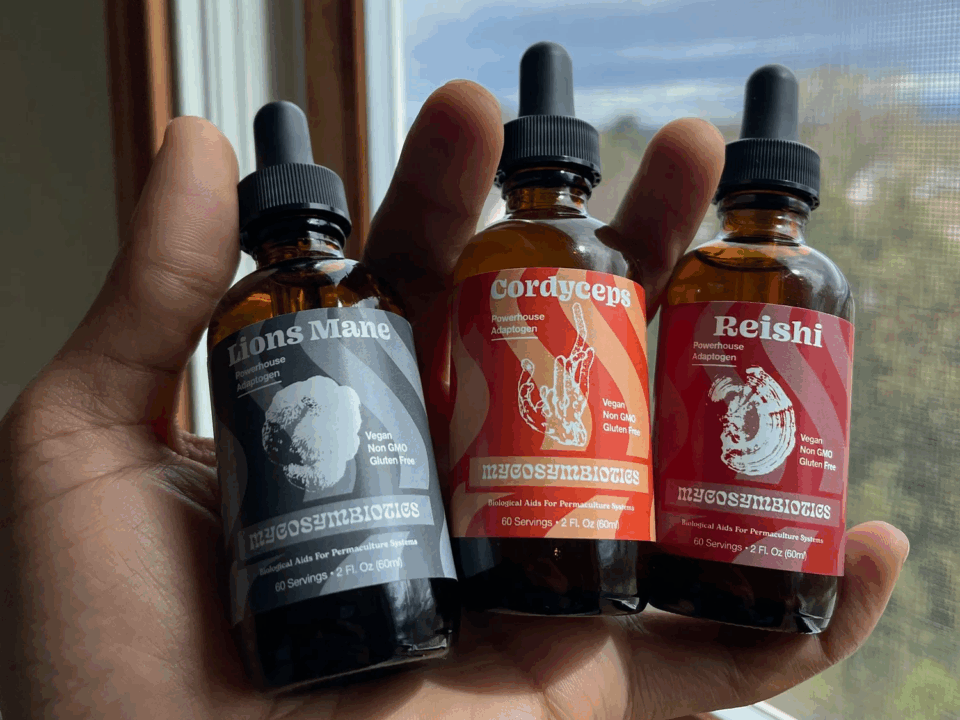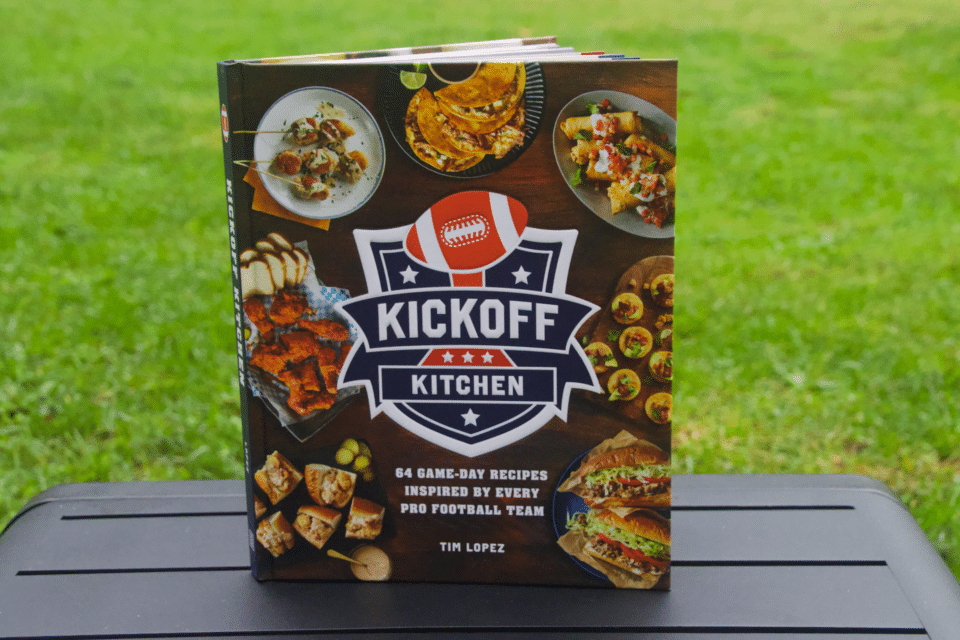We’ve all had them: great business ideas. Whether it’s opening a sweet little café or running a specialty food truck, it’s fun to dream big. But lots of dreams remain just that when the logistics and fine print of a business plan come into focus. Not so for Catie Gainor, who maneuvered the twists, turns and hurdles of an entrepreneurial venture to open a thriving little cook/book shop called Binding Agents in the heart of Philly’s Italian Market.
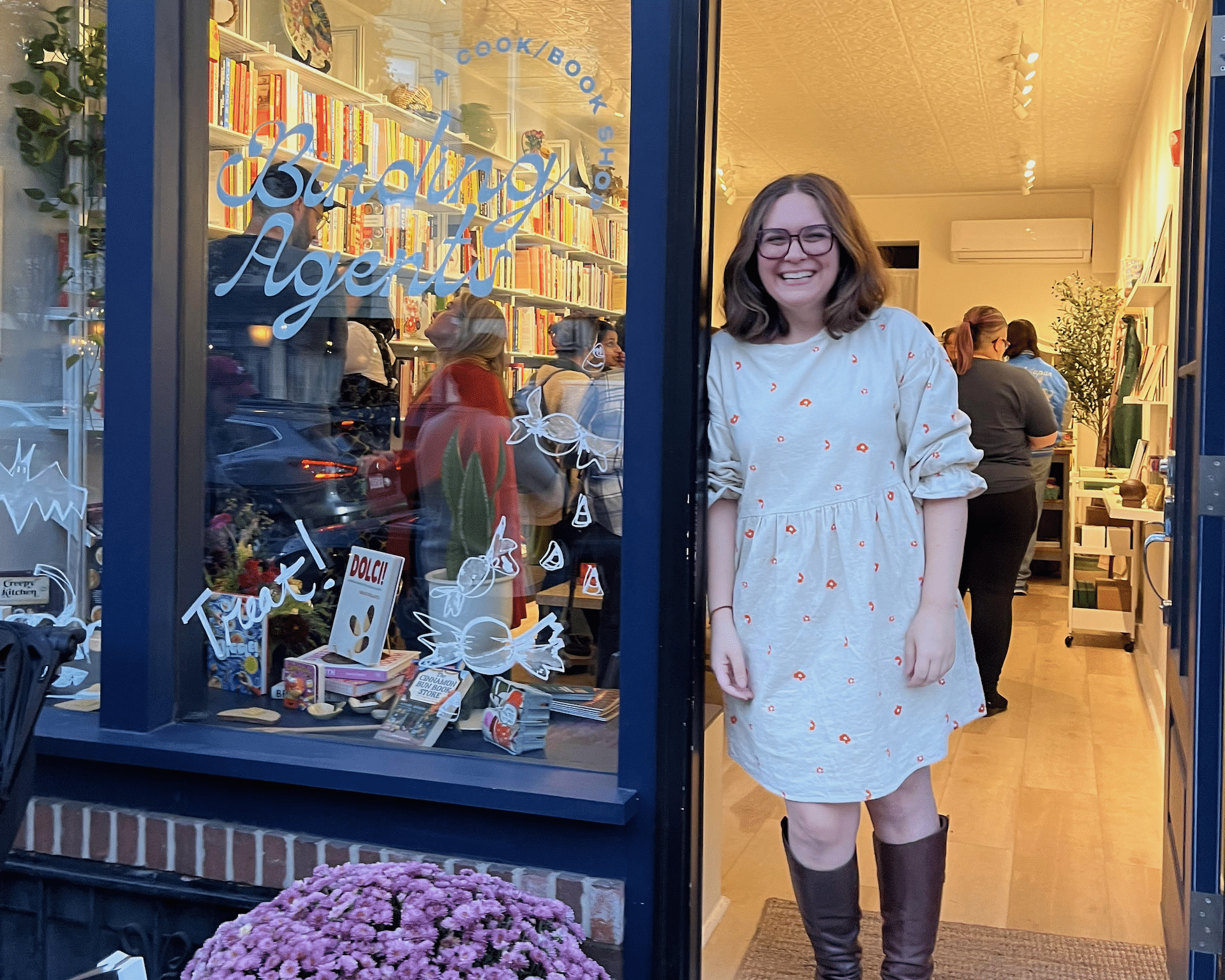
Gainor on opening night
We spoke with Gainor about becoming a purveyor of cook/books, fostering a community space, and how books about food are never, really, just about food.
PA Eats: Let’s start with your background. What did you used to do, professionally, and how did that evolve into opening Binding Agents?
Catie Gainor: I actually started my career in hospitality, working front of house while I lived in St. Louis, Missouri. I absolutely loved that work, but transitioned after a few years into marketing communications for arts organizations there. In 2016, I moved to Philadelphia with my now-husband, Matt, and shifted gears into traditional PR with an agency. I worked with the American Culinary Federation and some hospitality and travel brands before shifting focus to healthcare. That’s what I was doing when I had the idea to open Binding Agents.
I did work at a bookstore when I was in high school, so I had a little bit of background, but certainly not enough to be dangerous. Just the basics of how a bookstore is organized and experience recommending books and interacting with customers.
I took a little piece of all of the jobs that I ever had and brought them to this; my front of house experience and love of food and the restaurant industry, the experience of working in retail and managing materials in a shop, communications, partnership development and community-centered marketing and community-building, which I learned during my time in in the arts. All of those pieces come together in Binding Agents, which is as much an event and community space as it is a bookstore.
That’s awesome. So, what’s the learning curve been like?
Steep. It’s a stinker. I’ve been very fortunate that the American Booksellers Association and the regional association have incredible resources for new book sellers and perspectives for shop owners. That was super helpful to me. And many of the representatives from publishers and the folks who distribute books have been very generous with their knowledge and their time. But, it has been a lot of learning.
The process of going from having the idea for the shop to actually opening it took two years. I try to be honest about that with folks because I felt a lot of pressure after I had the idea to be able to open within months. I think that that’s the perception people have: that the hard part is coming up with what to do, and that people put businesses together really quickly. It’s certainly possible and some people have the skill and the drive in the capacity for that. With where I was in my life and the knowledge that I had, it just took more time. I gave myself the time to learn. I’m figuring out bookkeeping and accounting, trying to learn a little piece of that every day. Transparently, it’s very challenging. There’s a constant question in my mind of, ‘Did I do everything right?’ and I don’t even have a fraction of the challenges that folks trying to open food businesses have, when it comes to management of physical space and the responsibilities that come with that. So, things are certainly very difficult, but also very rewarding. It’s really cool to be able to be fully in control of things. It is really satisfying.
What was the vision? How did your name, space and branding come together?
It was a sequence and each piece sort of fed off the last. From the jump, I was very clear that it would be a culinary bookstore. I was taking direct inspiration from the cookbook shops across the country that I had visited. The moment the idea took root, I saw on social media that Book Larder in Seattle was hosting an event with J. Kenji Lopez-Alt and I said, ‘Wow, I wish we had that. Doesn’t that look so cool? What an amazing thing… Oh, God. I guess I have to open one.’
I was very lucky and also very frightened because, when I shared that idea with my husband, he immediately took me seriously. Then, my brother immediately took me seriously and my best friend immediately took me seriously. It really was like, ‘I guess I have to have to do it.’ So, I came up with the name and then I thought, ‘ Now I’m taking me seriously, because it would be a sin to waste that name.’
It’s a great name.
Thank you. I really appreciate you saying that. When I had the name, that felt real. I started looking at spaces and the one I’m in now was the very first commercial space I looked at. I knew it was the right neighborhood and that I wanted it to be small. Looking at the physical space, I could immediately see a wall of shelves and a table down the center. It was very clear to me how it would look.
For the brand and identity, I worked with my friend Sara DeViva, who is an incredibly talented designer. She was very generous with her time and ideas to help me figure out how that name could become a personality that would shape the shop. I gave her such deranged thoughts, saying, ‘Nancy Myers, but also unhinged… Coastal grandma, illustrated and a little bit bleak…’
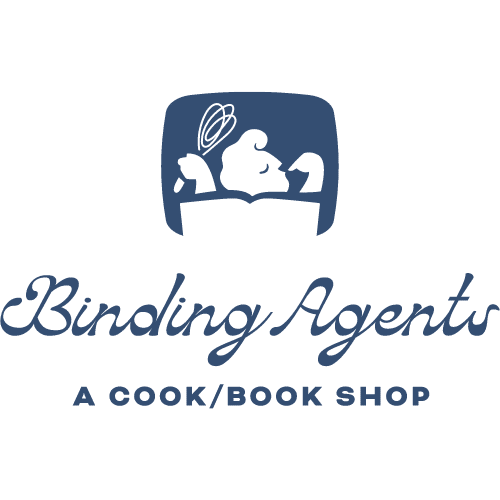
A vision board!
Yeah, it was. I sent her a really disparate set of inspiration and local brands that spoke to me and she was like, ‘Dude, this is really wild.’ But, she came up with something really amazing and we refined the character and font to make something that I think really reflects the place I want this to be, and how I want people to feel when they’re here.
What was it about the Italian Market that drew you in?
I’ve lived in the neighborhood since 2018, and I have loved it from the minute I arrived in Philadelphia. My family is a Italian-American, so there were a lot of things that I had missed during my time in Missouri that I immediately found myself having access to again. It brought me a lot of joy, particularly after my Mom died, to feel connected to her and the legacy of my family. My maternal grandparents owned an Italian deli in Secaucus, New Jersey for many years. So, being here feels like home to me, both in the sense of community and in the sense of a more distant feeling of nostalgia and love for for my family and their past.
The diversity in this community and all the amazing people making businesses and lives here is really vibrant and exciting. I think Philadelphia is an incredible food city no matter what neighborhood you’re in. But there’s there’s a certain history here in the Italian Market, and a logic to the idea that this is where you’re going for your meat, your cheese and your produce, and also for your cookbooks. That made sense to me. Once I saw this place and the opportunity that was here, I couldn’t really imagine putting the shop anywhere else.
How do you stay in tune to the publishing pipeline?
That’s one of the things that I’m working on getting better at. It really is just a matter of time. A lot of it is directly through the publishers and the folks who work with me and share catalogs of their upcoming books.
Typically, as a bookseller, you would be checking out those catalogs many, many months before releases and you’d be placing orders for entire seasons, if not the entire year. Because I’m new, it takes a little bit of time to ramp up to that place where you’re operating so far ahead. Last year, I had both support from the folks who produce and distribute books to help me understand what sells and what people are interested in, and also my curatorial instinct, like the range of titles and the types of books I want to to be developing here.
My opening inventory was a huge investment of time and one of the things that took the longest when preparing to open the shop. Now, it’s much easier because the foundation is there. I’m adding and adjusting from an existing place, which is a lot less daunting.
A lot of times, authors reach out to me directly. Much of the effort to promote and market a book as is left to the writer and the team behind them. Publishers, obviously, offer a lot of support, depending on the title, but many authors do a lot of of that work on their own.
I love (and recommend all the time) an amazing resource called Eat Your Books, which is a website that allows you to build a library of all of your cookbooks and recipes and turn that into a searchable database. They maintain an incredible blog and and list the upcoming books for the year that people are excited about. It’s a really, really helpful resource for me to gauge what will do well here and what’s important to have in stock.
But, a lot of it is my instinct and impression. My barometer for a book I want to have here is one that you can look through and find meaning and inspiration.
What are the main areas of content you planned to include in your inventory, and how do you organize the shop?
Local authors and books are really important to me and make the shop relevant for Philadelphia. We are so fortunate to have not just so many chefs and restauranteurs, but also food writers, recipe developers, cookbook editors and photographers who make their homes here as part of the incredible food community.
One of the reasons why I felt such a a call to do this was that it seems very unfortunate to me that the people who are working so hard to put those things out in the world didn’t have a home-base in Philly to celebrate those accomplishments. It is a huge labor of love to create a cookbook or food book or any book at all. So, local work was always at the center.
The shop’s sections reflect a spread of the types of books I wanted to have [including new cookbooks, culinary classics, fiction, nonfiction, food memoirs, children’s books and regional books]. There’s lots of different ideas around which to organize a cookbook. You have everything from the food of particular region or culture, an individual’s perspective that ties back to their identity, you have techniques like grilling, sous vide cooking or throwing it in a blender, you have baking books, beverage books, restaurant books and chef or celebrity personality-driven books.
As far as the different shop sections, that came to be when the books physically arrived here. I had 50 boxes of books and it was sort of a game of taking them out and playing with what aligns and what goes together. I went through that exercise and saw what took shape. I joke with customers that it’s my mind on the wall. It makes it easy for me to find books and make smart recommendations and get people to where they want to go. So, it’s my influence but also how the books speak to each other. They sort of told me how they wanted to be arranged.
For someone browsing, who might not have a clear idea of what they want, it seems like it creates a nice shopping experience, versus a strictly alphabetical organization.
Thank you. I think so. If you’re coming in saying, ‘I need a book that does this,’ I think this principle helps to make it so that you’re not relying on me to pull a book for you. I might be able to direct you to a section or a shelf and then walk away and let you have some fun. I find that very pleasurable.
I also knew, going in, that it wouldn’t just be cookbooks. I wanted a nonfiction section, a fiction section and kids books, too. Building those sections out has been a great pleasure and I hope they’ll get larger and more representative as time goes on.
What kinds of events do you host at Binding Agents, and why is that connection to the community important to you?
We have many types of events and more of that will come as as things take shape, but author events and signings have been a big piece. It’s really important to me to be a place where folks will make the stop in Philadelphia, when they otherwise might have skipped over us. So many creators making amazing books weren’t stopping here. They were going right from D.C. to New York or vice versa or onto Boston and Chicago and we were missing that middle ground. I really wanted to catch them and basically make them hang out with me and help them hang out with the rest of the fans and weirdos like me.
We host Cookbook Club monthly. Essentially, I pick a cookbook and folks sign up. They can purchase the book from us or not. I strongly encourage people to make use of the library or book sharing. About a week in advance, I send out a spreadsheet with a certain number of slots, and everybody brings a dish or a baked good. Everybody gets an opportunity to hang out, eat and see a spread of what the book offers. Hopefully, they discover something they not have chosen to make, themselves, and get good tips from other people. Everyone learns something while preparing their dish that they can share with others so they can avoid similar pitfalls or make the most of of a recipe. I think it’s a really exciting way to explore a book and meet people.
We’ve also had Collectors Corner, which is an opportunity for a cookbook enthusiast to talk about their collection in a particular facet of cuisine or foods and how it travels through books. I will eventually do what I’m calling Book Book Club, just focused on fiction or non-fiction books. We’ve had pop-ups with partners and vendors like bakers who might be testing out a concept or just want to come in and offer things to the people in the neighborhood. So, lots more formats to come. People are telling me what they are eager to to do, so we will try it all and see what sticks.
A key piece of the business is that I wanted a place that was firmly rooted in the physical world, where people could come and be with each other. Along with almost everyone else, I was really I was really rocked by the pandemic, the isolation and feeling trapped behind the screen. The feeling of community was missing, even though I was on Zoom all day. I wanted those more serendipitous interactions with others, and I hope that Cookbook Club and some of our other events offer that to people. When you’re an adult, it’s hard to meet people, and that’s a big part of why the events and Cookbook Club, in particular, are so important to me. It’s a really pure expression of my values and goals for the shop to be a gathering place for people.
What has surprised you about what people gravitate towards and what is really popular?
That’s a really good question. It’s notable to me the number of people looking for vegetarian, vegan and plant-based cookbooks. They are often surprised by the wide variety of options available to them now, particularly in specific regions and cultural cuisine. You can find Korean vegan, Chinese vegan, Turkish vegetarian and lots of different books and along those lines that I think many people are not aware exist.
I have been gratified by the number of people who are excited to explore a particular regional food or heritage cuisine that’s not their own. They’re excited to seek out ingredients and a new ways of eating. I’m really proud of our regional cultural section and it’s one of the ones I have the most fun with, myself.
I find that there is a desire to replace online sources of recipes. Maybe not totally replace, but to take the screen out of the experience of cooking in some ways, when possible. A lot of people are looking for books that will help them just with dinner on a Tuesday. They’re tired of the experience of navigating food blogs. People don’t want to be looking at their phone when they’re trying to cook.
I noticed that you sell Crying in H Mart, much of which was inspired by Michelle Zauner’s time in and around Philly.
Yes. I think it’s cool that a really specific, special and evocative story broke through in that way. It’s amazing to me. A few weeks ago, a really nice dude came in and got a cookbook, and was like, ‘Maybe you can answer this for me: I just don’t understand why people would read food writing. It just seems like it makes you hungry. I don’t know what the value of that could be.’
I said, ‘Well, I think that it’s one of the many lenses that people use to pass through things about the world that interest or preoccupy them. For some people, it’s film, it’s literature, it’s the economy, it’s all sorts of other things. And, for some people, it’s food.’
No book about food is exclusively about food. Crying in H Mart is about food, and it’s also very much not about food at all. That is why I think having a niche focus like this works, because no book in the store is only about food.
Are you seeing any trends in genres or what writers are focusing on these days?
Any given year, there are little pockets and niche areas of the world that get explored a bit more more. I think we’re at the beginning of a greater interest in Eastern European cooking and breaking down what had been cultural monoliths, from a Western perspective. I think many people have this idea of “Middle Eastern cuisine” or “Mediterranean cuisine,” and now we’re seeing books that are focused on particular cultures within those regions, which is really important because those food ways are not monolithic. They vary from place to place and family to family. Books are starting to showcase, document and preserve more food ways and cultural ways of eating.
I think we’re seeing more and more plant-based books – not just vegetarian, but vegan. And books about responsible eating. People want to align the way they eat with their values and books are increasingly coming out that try and help them do that.
Also, baking books are getting more culturally specific. I think they used to be organized around a particular concept, whether it was cakes or pastry or bread. Now, I see more variety and people talking about where they come from, their palates, and how their background influences their baking. There’s a kind of deconstruction of the supremacy of a French technique, which is not to say at all that there’s not incredible value and an amazing experience to be had there, but just that it’s not the only way.
Is there anything you’re personally digging right now?
Well, I have a toddler, so I’m stoked on cooking things that excite her. Not just, ‘What will she eat?’ but what excites her and will be new for her. That has totally changed my relationship with food and thinking about what comes out of my kitchen. Seeing her interact with and prepare food with me, stand up on her little stand and work is really exciting to me and, for that reason, the kids book section is one of my favorites to curate and recommend from.
Having a little one sort of forces you to step back and remember trying something for the first time. You forget that there was the first time you ate broccoli and the first time you ate chocolate ice cream or whatever it is. It’s exciting to get back to brass tacks of, ‘Oh, this is new for you, and it actually is remarkable. Cake rules! I agree!’
Two thumbs up.
Five stars, 10 out of 10, no notes.
Are there any cook/books you recommend as great gifts or underrated reads?
Of course, I love finding the right gifts among the cookbooks. Pasta books crush as gifts, always. But the non-fiction section has some really cool stuff. I love directing people to that section for gifts. There’s a book about the eel industry called Slippery Beast by Ellen Ruppel Shell that’s wildly fascinating and a great gift for anybody who’s into history and food sourcing.
I had somebody come in around the holidays asking, ‘Do you have any books about hot dogs?’ and I was like, ‘Yeah I do!’ I’ve got a book called Raw Dog by Jamie Loftus, which is all about hotdogs but also about the end of a relationship, wandering around the city, experiencing the place she lives and grieving loss. It’s extremely good.
There’s a book called Have You Eaten Yet that I’ve been recommending, which is stories from Chinese restaurants around the world. It’s about how the Chinese diaspora became such a core contributor of our food culture in America, and how it’s different here than in other countries.
And chef memoirs, obviously, can be a great fit as as a gift for people.
Very cool. We recently featured Mike Madaio’s A History of Philadelphia Sandwiches, and it was fascinating to learn about how these unique sandwiches came about and how they reflect the city’s cultural history.
I totally agree. I had somebody come in the other day who had read a printed snippet of it while eating a sandwich at Paesano’s. He ran over here and said, ‘Do you have A History of Philadelphia Sandwiches?’ I said, ‘Of course I do. I have a signed copy.’ I was very happy to connect him with that book. Another good one is Unique Eats and Eateries of Philadelphia by Irene Levy Baker. They’re both great lenses to look at our local culture, the food we eat now, what it was like before and how I got to the be the way it is.
Is there anything else you’d like to mention?
Just for people to keep an eye out for events and opportunities to come here and be with others.
You can find Binding Agents at 908 Christian St., Philadelphia and keep tabs on upcoming events via its event and Instagram pages!
- Feature photo : Binding Agents
- Seated Cookbook Club photo: Esra Erol
- Italian Market photo: Bigstock
- Exterior and children's books photo: Leigh Green
- All other photos: Binding Agents
